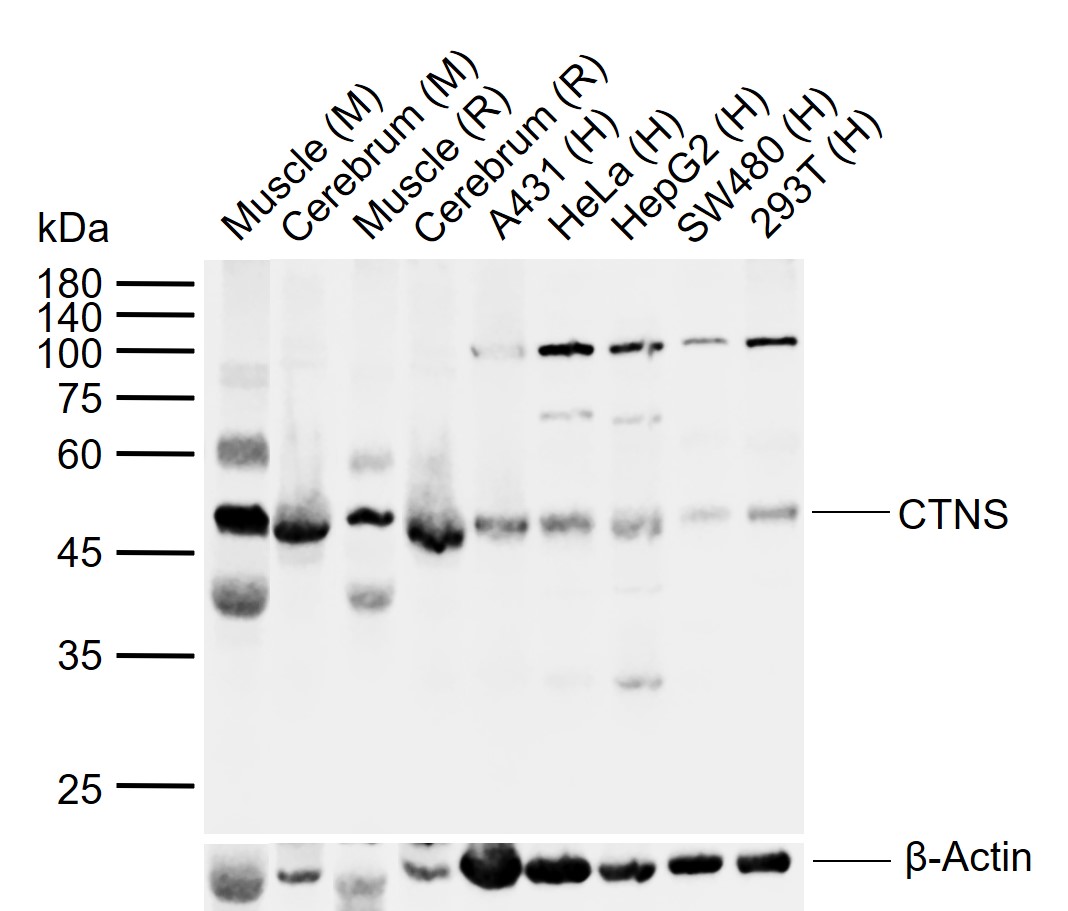
Rabbit Anti-CTNS antibody
CTNS LSB; Cystinosin; cystinosis, nephropathic; PQLC4; CTNS_HUMAN.
View History [Clear]
Details
Product Name CTNS Chinese Name 胱氨酸抗体 Alias CTNS LSB; Cystinosin; cystinosis, nephropathic; PQLC4; CTNS_HUMAN. Research Area Tumour Cell biology Signal transduction Cell type markers The new supersedes the old Transmembrane protein Immunogen Species Rabbit Clonality Polyclonal React Species Human, Mouse, Rat, (predicted: Rabbit, ) Applications WB=1:500-2000 ELISA=1:5000-10000 IHC-P=1:100-500 IHC-F=1:100-500 ICC=1:100-500 IF=1:100-500 (Paraffin sections need antigen repair)
not yet tested in other applications.
optimal dilutions/concentrations should be determined by the end user.Theoretical molecular weight 42kDa Cellular localization cytoplasmic The cell membrane Form Liquid Concentration 1mg/ml immunogen KLH conjugated synthetic peptide derived from human CTNS/Cystinosin: 231-330/367 Lsotype IgG Purification affinity purified by Protein A Buffer Solution 0.01M TBS(pH7.4) with 1% BSA, 0.03% Proclin300 and 50% Glycerol. Storage Shipped at 4℃. Store at -20 °C for one year. Avoid repeated freeze/thaw cycles. Attention This product as supplied is intended for research use only, not for use in human, therapeutic or diagnostic applications. PubMed PubMed Product Detail Cystinosis is an autosomal recessive disorder resulting from defective lysosomal transport of cystine and present at birth as a failure to thrive, rickets and proximal renal tubular acidosis. The human CTNS gene on chromosome 17p13 encodes the protein Cystinosin, and mutations in CTNS are responsible for nephropathic cystinosis. The CTNS promoter contains an Sp1 binding element. Cystinosin is an integral membrane protein containing 7 transmembrane domains that functions as a H+-driven transporter responsible for cystine export from lysosomes. In humans, Cystinosin is expressed abundantly in pancreas, kidney (mature and fetal), and skeletal muscle. The mouse homolog to CTNS encodes a protein which is expressed in all tissues except skeletal muscle. In the cell, Cystinosin co-localizes with LAMP-2 to lysosomes. A C-terminal GYDQL sorting motif within Cystinosin is critical for lysosomal localization.
Function:
CTNS (Cystinosin) is thought to transport cystine out of lysosomes. Mutations in the CTNS gene are the cause of cystinosis.
Subcellular Location:
Lysosome membrane; Multi-pass membrane protein.
Tissue Specificity:
Strongly expressed in pancreas, kidney (adult and fetal) and in skeletal muscle. Expressed at lower levels in placenta and heart. Weakly expressed in lung, liver and brain (adult and fetal).
DISEASE:
Defects in CTNS are the cause of cystinosis nephropathic type (CTNS) [MIM:219800]. It is a form of cystinosis, a lysosomal storage disease due to defective transport of cystine across the lysosomal membrane. This results in cystine accumulation and crystallization in the cells causing widespread tissue damage. The classical nephropathic form has onset in the first year of life and is characterized by a polyuro-polydipsic syndrome, marked height-weight growth delay, generalized impaired proximal tubular reabsorptive capacity, with severe fluid-electrolyte balance alterations, renal failure, ocular symptoms and other systemic complications.
Defects in CTNS are the cause of cystinosis adult non-nephropathic type (CTNSANN) [MIM:219750]. It is a form of cystinosis, a lysosomal storage disease due to defective transport of cystine across the lysosomal membrane. This results in cystine accumulation and crystallization in the cells causing widespread tissue damage. Cystinosis adult non-nephropathic type is characterized by ocular features and a benigne course. Patients manifest mild photophobia due to conjunctival and corneal cystine crystals.
Defects in CTNS are the cause of cystinosis late-onset juvenile or adolescent nephropathic type (CTNSJAN) [MIM:219900]. It is a form of cystinosis, a lysosomal storage disease due to defective transport of cystine across the lysosomal membrane. This results in cystine accumulation and crystallization in the cells causing widespread tissue damage. Late-onset juvenile or adolescent nephropathic cystinosis manifests itself first at age 10 to 12 years with proteinuria due to glomerular damage rather than with the manifestations of tubular damage that occur first in infantile cystinosis. There is no excess amino aciduria and stature is normal. Photophobia, late development of pigmentary retinopathy, and chronic headaches are features.
Similarity:
Belongs to the cystinosin family.
Contains 2 PQ-loop domains.
SWISS:
O60931
Gene ID:
1497
Database links:Entrez Gene: 1497 Human
Entrez Gene: 83429 Mouse
Omim: 606272 Human
SwissProt: O60931 Human
SwissProt: P57757 Mouse
Unigene: 187667 Human
Unigene: 259852 Mouse
Product Picture
Lane 1: Mouse Muscle tissue lysates
Lane 2: Mouse Cerebrum tissue lysates
Lane 3: Rat Muscle tissue lysates
Lane 4: Rat Cerebrum tissue lysates
Lane 5: Human A431 cell lysates
Lane 6: Human HeLa cell lysates
Lane 7: Human HepG2 cell lysates
Lane 8: Human SW480 cell lysates
Lane 9: Human 293T cell lysates
Primary: Anti-CTNS (SL12932R) at 1/1000 dilution
Secondary: IRDye800CW Goat Anti-Rabbit IgG at 1/20000 dilution
Predicted band size: 42 kDa
Observed band size: 48 kDa
Bought notes(bought amounts latest0)
No one bought this product
User Comment(Total0User Comment Num)
- No comment



 +86 571 56623320
+86 571 56623320
 +86 18668110335
+86 18668110335

